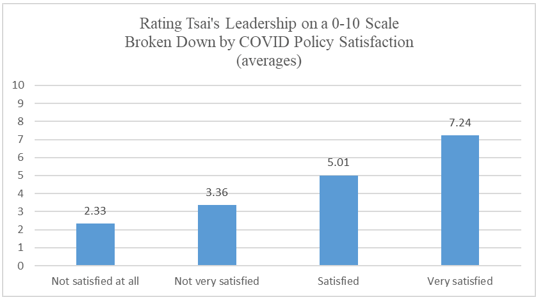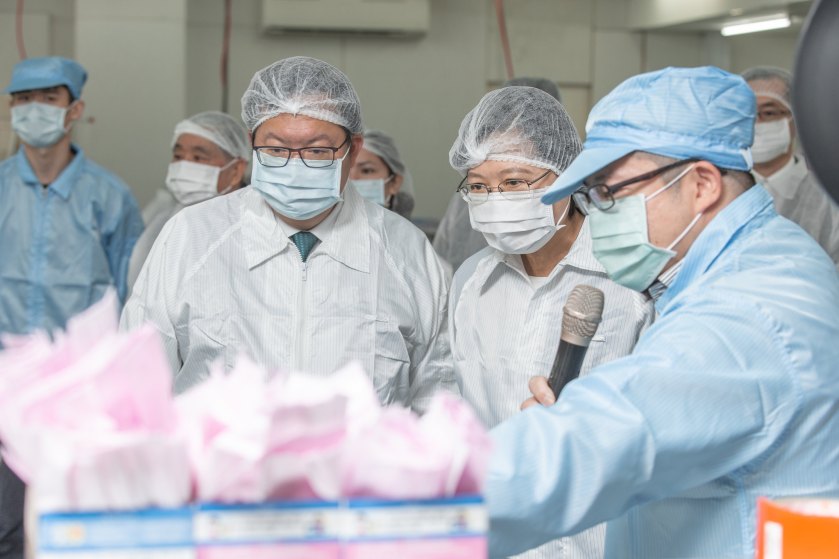Written by Timothy S. Rich and Madelynn Einhorn.
Image credit: 03.09 總統訪視「易廷企業有限公司」by 總統府/Flickr, license CC BY 2.0
How does the Taiwanese public view COVID-19 policies and do these efforts boost evaluations of President Tsai Ing-wen? Taiwan received international acclaim for its aggressive response to the pandemic. Such policies included standard social distancing and mask mandates seen in most countries, with centrally coordinated quarantine and contract tracing policies, and fines of over $3000 US for violating quarantines. Due to these efforts, people in Taiwan are 3,400 times less likely to die from COVID-19 than people living in the U.S.
The results have been clear: a 253-day streak without a single local case until a New Zealand pilot violated quarantine in December and less than 900 total cases since the country’s first case in January and only seven reported deaths. The results are remarkable, especially since John Hopkins University predicted that Taiwan would have the second-highest percentage of world cases, only behind China.
We want to unpack public perceptions of COVID measures and its impact on evaluations of President Tsai. As early as March, 84% of Taiwanese polled supported the administration’s measures, with even high approval ratings for health minister Chen Shih-Chung. Later polls show positive evaluations on the COVID response and Tsai’s public approval rates. However, poll results are rarely disaggregated by partisan identification or analyzed for how views of the response may influence other views.
Elsewhere, views on COVID responses typically show a partisan divergence. Our survey research in March 2020 found South Koreans supportive of the incumbent center-left Minjoo Party were far more satisfied with the government’s COVID response than supporters of the conservative United Future Party. Nevertheless, this divergence declined by September as South Koreans, across party lines, saw the government response in a more favorable light.
To address perceptions of Taiwan’s handling of COVID-19, we analyze newly released individual-level survey data from National Chengchi University’s Taiwan’s Election and Democratization Study (TEDS2020_PA09), with a sample of 1,214 Taiwanese respondents surveyed in September. The figure below shows that overall, 90.95% of respondents were satisfied or very satisfied with government performance regarding COVID-19. Yet, even here, we see a clear partisan divergence, with 98.09% of Democratic Progressive Party (DPP) supporters satisfied, compared to 79.12% Kuomintang (KMT) supporters. While the divergence is not as steep as we have seen in South Korea, the preliminary results suggest a partisan lens’s influence.

Regression analysis shows that this partisan divergence endures after controlling for age, education, gender, and position on Taiwan’s future status (unification, status quo or independence). Of particular note, we find that education negatively corresponds with satisfaction, surprisingly. Potentially, more educated Taiwanese have focused on relatively minor flaws in Taiwan’s strategy, such as the Central Epidemic Command Center’s (CECC) controversial decision not to allow children of Taiwanese-Chinese couples to repatriate to Taiwan.
We also wanted to see if views on the government’s handling of COVID positively influenced evaluations of Tsai’s leadership more broadly. The TEDS survey asks respondents to evaluate Tsai’s overall leadership on a 0-10 scale. Thus, we find an average score of 6.18 overall, a 7.90 among DPP supporters and a 3.89 among KMT supporters. Separating these views on COVID shows a clear positive correlation, with those not satisfied at all on average scoring Tsai’s leadership a 2.33, compared to 7.24 for those very satisfied.

Admittedly, this pattern may just be picking up those who were already generally supportive of Tsai’s policies separate from the COVID response. To unpack perceptions further, we conducted additional regression analyses. Using the 0-10 leadership scale as the dependent variable, and satisfaction on COVID policy as the main independent variable, we see evaluations of Tsai’s leadership increases by 1.92 points for each increase in COVID policy satisfaction, even after controlling for other factors. Furthermore, we also tested models that controlled for evaluations of Tsai’s performance on cross-strait relations, diplomacy, national defense, economic development, and livelihood issues. Here we found that satisfaction on COVID policy had the second-largest positive effect on views about Tsai’s overall leadership, with only handling of livelihood issues registering a similar substantive effect. Moreover, the statistical relationship’s strength was even stronger when only analyzing those who did not identify with the DPP. The results suggest a broad implicit acknowledgement of the administration’s efforts while potentially providing Tsai greater leeway on other issues than otherwise expected.
Another potential reason Taiwanese citizens are satisfied with the government’s COVID response is the projected economic growth for Taiwan compared to most other countries. The Taiwanese GDP is expected to expand 2% this year and exports have increased by 5% while global trade has shrunk by 10%. Similarly, Taiwan’s relatively COVID-free lifestyle has attracted talent from all over the world, with some residency permits more than doubling. For most countries, COVID has pushed them into one of the worst recessions in recent memory, impacting unemployment rates and debt levels. However, for Taiwanese, life is relatively the same. We directly assessed whether the handling of COVID influenced perceptions of Taiwan’s economic future. We found that those more supportive of the handling of COVID expected a better future economy, not only after controlling for the same demographic and partisan factors previously mentioned, but economic evaluations of the previous six months. Thus, it appears that Taiwanese realize that the administration’s COVID response has prevented the economic downturns seen elsewhere.
The results overall suggest that even with a minor partisan divergence in views on the country’s COVID response, Tsai appears to receive an additional boost in public satisfaction due to the administration’s handling of the pandemic. Such positive perceptions are useful for Tsai, who has historically accumulated political capital and invested in long-term projects, such as the New Southbound Policy, to diversify Taiwan’s economic relationships in Asia. However, we should also be cautious in assuming that the Taiwanese public would continue to place COVID response evaluations in a separate category if COVID cases spike. In other words, the Tsai administration has benefited from positive coverage of their response to the pandemic, but this can only endure if the administration quickly responds to any cases that do emerge. Otherwise, it risks undermining goodwill.
Timothy S. Rich is an Associate Professor of Political Science at Western Kentucky University and Director of the International Public Opinion Lab (IPOL).
Madelynn Einhorn is an Honors undergraduate researcher at Western Kentucky University, majoring in Political Science and Economics.


First, what does “a partisan lens’s influence” on public perception of undisputedly successful and mostly apolitical measures suggest? It suggests that the expressed views diverge with some individuals from factual reality, in Taiwan’s case still close to one fifth of the population. That may be (a) because some individuals express other views than they actually hold or (b) because they simply missed the factual reality.
In case a, the results of a survey of expressed views diverge from actual public perception. And if we assume that individuals’ behaviour is influenced by actual views rather than by expressed views, we can conclude that a survey of expressed views just satisfies our curiosity but does not add to our understanding.
In case b, a scholar learns nothing if there is a prior assumption that any individual’s world view is incomplete as well as skewed in some parts. However, a politician’s hopes for re-election may improve if the survey results are favourable, shaky as those hopes may be because of the fickleness of the electorate.
Second, let me rephrase the conclusion from the article as is: “the Tsai administration has benefited from positive coverage of their response to the pandemic, but this can only endure if the administration quickly responds to any cases that do emerge. Otherwise, it risks undermining goodwill.”
If Taiwan’s government does well, it has a good chance to be popular. However, as soon as it fails to govern well, it may loose its popularity. What a surprising insight!
LikeLiked by 1 person